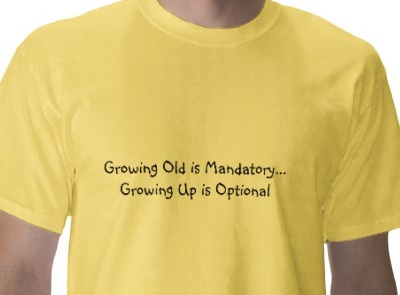
13 Sep 18, 21 or 30: When do you become an adult?
Adulthood is a stage of being where we are responsible for ourselves and have proven to be capable of independence from our parents. This is the stage of our lives when we realise our childhood and teenage dreams and when we are judged by the decisions we make.
But how do we know when we have reached that point, and it’s time for us to start making those decisions? What’s the formal milestone that we use as a marker? What’s the rite of passage?
Is it paying your own Bmobile or Digicel bill, or buying your first house? Or do you think we automatically become an adult when we reach the legal age in the country we live in?
I recently had a chat with Chris Holdsworth, a lecturer at the University of Calgary here in Canada, about rites of passage, and their three stages – the preluminal, luminal, and post-luminal. A rite of passage serves not only to celebrate and honour an individual’s growth. It also provides:
1. Context, as a reference point for our future reflection – through separation from our familiar environment (preluminal).
2. Tools to help navigate through the next phase of our development – the transition phase (luminal).
3. A sense of achievement and rejuvenated energy for life – reincorporation into society (post-luminal).
“Do you think we automatically become an adult when we reach the legal age in the country we live in?”
I’m sure we can all remember how excited we were when we completed secondary school. Apart from thinking, “Yesss, I don’t have to deal with that stupid teacher anymore”, our nervousness about the future, as we made plans for our next steps, would have been at the top of our minds.
Our graduation from secondary school serves as a type of rite of passage. It’s an external effect that reflects a new internal reality, a creation of self. This rite often happens before we are capable of the type of independence I mentioned previously, and all too often we ascend through the next, major milestones without actually understanding the significance of the ceremonial rite, and the tools that are imparted during this process. Therefore, we often go headfirst into our next stage of development unconsciously navigating the natural challenges that lie within each cycle.
Without the formal knowledge of the tools we were given in our previous stage and the sense of community that is usually achieved by these rites of passage, we often end up making poor decisions in our adult life. I know we are all allowed to make mistakes, but these rituals help us avoid the easy ones.
After a bit of digging, I have come to the conclusion that outside of religious rites of passage, which mainly deal with our spiritual growth, this tradition is almost non-existent in western society, and the available options hardly substitute for providing preparation for youths on our spiritual, physical and emotional journey of life. Don’t get me wrong… you won’t find my ass running down no lion or tiger to prove I am a man like in the movie 3000 B.C… but the most popular tradition with close resemblances to a rite of passage into adulthood is graduation from some form of tertiary education, or, for those who don’t mind being shouted at and crawling through the bush ‘training’, enrolment in some extracurricular activities such as Cadets or Scouts.
The practice of a formal rite of passage celebrated by our community has more or less faded into the history books for us in the western world.
“Everything in nature goes through cycles and the completion of each cycle is marked by a significant event.”
Part of the reason for this lapse in tradition lies with our emphasis and dependence on technology, and the fact that most of us have lost touch with nature in our search for worldly possessions. Now I’m not saying that the hippies have it right either, but they do have a valid point. Everything in nature goes through cycles and the completion of each cycle is marked by a significant event – the butterfly eats its way out of the cocoon, and some crustaceans change shells when they outgrow their old ones. So it must be important for us to mark these occurrences in our individual lives.
Upon reflection on my life, I would say that my rite of passage has been stretched out over the last seven years – moving to England, completing university, and having hits and misses in my personal life. I am now fully aware of who I am and what I want to achieve in my adult life, spiritually, physically, and emotionally.
The reason why I think it has lasted so long though is because I never returned to my family for any length of time until recently. Without this reincorporation I don’t think I was able to confirm to myself that the decisions I made about my life felt correct. Writing this article has actually contextualized a few new things for me as well about the process… and here I was walking around thinking I was a big man!!! Ha ha. Maybe I should go to the club tonight to celebrate!
Seriously though, worldly possessions and age cannot be a representation that we have fully completed our adolescent phase, and crossed over to adulthood. Neither can our mere independence, because without the formal self-actualisation process to mark the milestone we have crossed, the transition could last a lot longer than it should.
About Anthony La Borde
Anthony La Borde considers himself an entrepreneurially minded idea generator, and plays a key role in a number of business ventures. He loves to start conversations and entertain people with his sometimes controversial thoughts.
Twitter •


No Comments